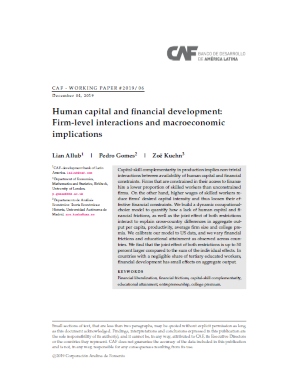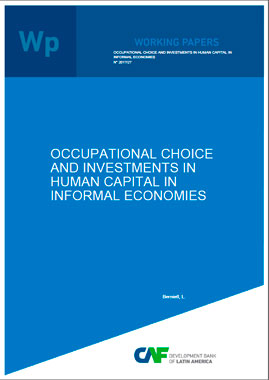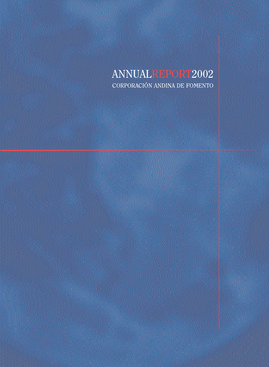Human Capital and Financial Development: Firm-Level Interactions and Macroeconomic Implications
Resumen
Capital-skill complementarity in production implies non-trivial interactions between availability of human capital and financial constraints. Firms that are constrained in their access to finance hire a lower proportion of skilled workers than unconstrained firms. On the other hand, higher wages of skilled workers reduce firms’ desired capital intensity and thus loosen their effective financial constraints. We build a dynamic occupational choice model to quantify how a lack of human capital and financial frictions, as well as the joint effect of both restrictions interact to explain cross-country differences in aggregate output per capita, productivity, average firm size and college premia. We calibrate our model to US data, and we vary financial frictions and educational attainment as observed across countries. We find that the joint effect of both restrictions is up to 50 percent larger compared to the sum of the individual effects. In countries with a negligible share of tertiary educated workers, financial development has small effects on aggregate output.
Materia
País / Región
Fecha
2019-12-04Citar de esta publicación
Item perteneciente a la Colección
Autor
Allub, LianGomes, Pedro
Kuehn, Zoë
Items Relacionados
Occupational Choice and Investments in Human Capital in Informal Economies
Countries di er greatly in their levels of schooling and also in their rates of entrepreneurship. At the same time, the share of the so-called \shadow ...
RED 2016. More Skills for Work and Life: The contributions of Families, Schools, Jobs, and the Social Environment
Skills are the mainstay of human capital. They are the capabilities that a person has to effectively solve different problems. Skills include not only ...
Annual Report 2002
Though facing a complex global context and adverse circumstances for Latin America –most notably, the substantial reduction in external capital flows ...





